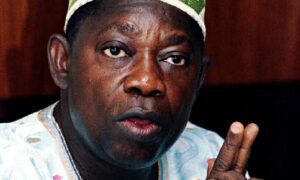MOSOP calls for probe of Shell over $173bn unaccounted oil revenue, laments Shell’s hurried divestment of assets

Twenty-nine years after the state-sponsored execution of environmental activist Kenule Saro-Wiwa and eight others, the Movement for the Survival of the Ogoni People (MOSOP) has urged the Federal Government to investigate Shell Petroleum Development Company (SPDC) over an estimated $173.8 billion allegedly concealed during its operations in Ogoni between 1958 and 1993.
In a statement issued in Port Harcourt on Sunday, MOSOP President Fegalo Nsuke marked the 29th memorial of the executions ordered by the Abacha regime, calling for accountability from Shell. Nsuke alleged that while Shell reported a daily production of 28,000 barrels, Ogoni fields had a production capacity of at least 350,000 barrels. He called for a probe into what he described as “economic sabotage,” citing an unreported daily output of 322,000 barrels, which, at $50 per barrel, would amount to $173.8 billion in lost revenue.
“Shell drilled over 200 oil wells in Ogoni, with high porosity and permeability, and yet reported an average of 140 barrels per well,” Nsuke stated. “This doesn’t make economic sense.”
Nsuke further asserted that Ogoni fields could produce over 500,000 barrels per day, urging the Nigerian government to investigate discrepancies between Shell’s reported figures and official estimates. “Shell must be held accountable for the pollution and economic losses inflicted upon Ogoni and the Niger Delta,” he added, referencing both the UNEP report on Ogoni and a recent report by the Bayelsa State Environmental Commission.
Regarding Shell’s recent divestment of assets, Nsuke expressed concern that the move could enable the company to evade liability for its environmental impacts in the region. “Divestment would transfer both assets and liabilities to a new company, allowing Shell to escape the consequences of reckless practices that have killed many and endangered millions,” he said, urging the government to halt the divestment program.
Nsuke also advocated for the abolition of the death penalty, citing the loss of innocent lives due to wrongful convictions. “The death penalty has unfortunately cost our country valuable lives, some of whom were innocent. We can save these lives by ending the death penalty,” he stated.
In closing, Nsuke called on the Federal Government to prioritize development in Ogoni, urging a change in its approach to the region’s challenges. MOSOP, he said, remains committed to ensuring a fair share of Ogoni resources is invested in the community’s development.





